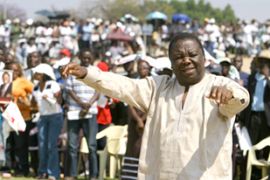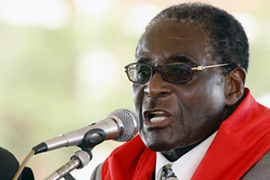Zimbabwe PM hits out at Mugabe
Tsvangirai says president “persecuting” MDC members and violating power-sharing deal.

Improving conditions
Tsvangirai joined Mugabe in a unity government in February in a bid to end political unrest that erupted after last year’s disputed elections and things have improved in the past few months.
Al Jazeera’s Haru Mutasa, reporting from the capital, Harare, said “compared to December last year, when things were really bad in the country … there’s now food in the shops – it’s expensive, but at least people can afford it”.
| In video |
|
|
“Hospitals are slowly functioning, doctors and nurses are going back to work, teachers are going back to schools – they’re complaining about low wages, but at least things are functioning.
“In terms of water, which caused a major cholera outbreak a few months ago, it is slowly coming back to some of the homes – in Harare at least.”
But power struggles over government posts and claims of the continued persecution of Tsvangirai’s supporters have made Western states reluctant to provide direct aid to the country.
The two leaders remain at odds over key ministerial appointments and Mugabe stands accused of dragging his feet over reforming media laws and the security forces.
Nelson Chamisa, a spokesman for the MDC, told Al Jazeera that the power-sharing government is on shaky ground.
“We need to go back to the people, ask the fundamental question: is it really worth it? is it sustainable for us to continue to be in an inclusive government with people who do not understand and appreciate the common dictates of logic?”
‘New phase’ with EU
While MDC supporters rallied in the city of Bulawayo on Sunday, an EU delegation wrapped up a two-day visit in Harare, the first such visit to the country in seven years.
The European Union has said its relations with Zimbabwe are entering a “new phase” and that the Mugabe-Tsvangirai power-sharing deal still needs to be fully implemented.
The EU, which is the largest overall aid donor to Zimbabwe, has maintained sanctions against Zimbabwe since a disputed 2002 presidential poll.
“Now we’re entering a new phase,” said Gunilla Carlsson, Sweden’s international development minister.
“The political agreement was an important step forward, but much needs to be done. The key to re-engagement is the full implementation of the political agreement.”
Mugabe has frequently blamed his country’s problems on EU sanctions that include travel restrictions on him and his allies as well as the freezing of their assets.
 |
| Mugabe blames sanctions for Zimbabwe’s woes but the EU points to mismanagement [AFP] |
“Sanctions are serving no humanitarian purpose, they are causing lots of suffering among the people right at the bottom,” he said following his meeting with the EU delegation, in which he said they established a “good rapport” and described as “quite a friendly meeting” just a day after lashing out at “bloody whites” for meddling in Zimbabwe’s affairs.
The EU says mismanagement and a poor human-rights record – rather than sanctions – are behind Zimbabwe’s strife.
Ayesha Kajee, the programme director for the International Human Rights Exchange, said that the removal of sanctions would have little effect on Zimbabweans.
“I believe that lifting sanctions won’t have any significant impact on the man in the street because the sanctions currently in place are … targeted at high-level government ministers and people within the government,” she told Al Jazeera from Johannesburg in neighbouring South Africa.
“However, it has been a convenient scapegoat for Mr Mugabe and his government to lambaste the West and the European Union.”
The EU has backed Tsvangirai, whose appointment as prime minister under a South African-mediated power sharing agreement was supposed to bring an end to Zimbabwe’s political turmoil.
